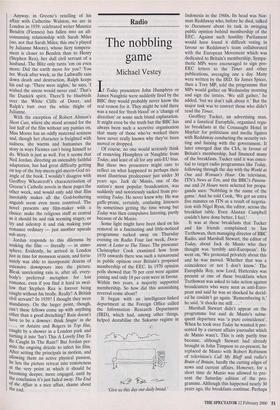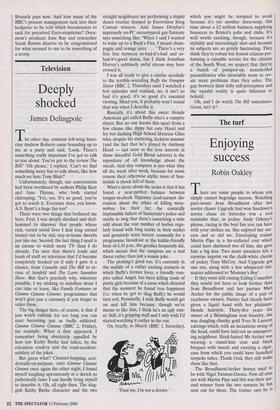Radio
The nobbling game
Michael Vestey
If Today presenters John Humphrys or James Naughtie were suddenly fired by the BBC they would probably never know the real reason for it. They might be told there was a need for 'fresh blood' or a 'change of direction' or some such bland explanation. It might even be the truth but the BBC has always been such a secretive organisation that many of those who've worked there have never really known why they've been moved or dropped. Of course, no one would seriously think of removing Humphrys or Naughtie from Today, and least of all for any anti-EU bias. But these two presenters might care to reflect on what happened to perhaps their most illustrious predecessor just under 30 years ago. Jack de Manio, one of the nation's most popular broadcasters, was suddenly and notoriously sacked from pre- senting Today. He never knew why. He was gaffe-prone, certainly, confusing listeners by sometimes getting the time wrong but Today was then compulsive listening, partly because of de Manio.
Some light might have been shed on his removal in a fascinating and little-noticed programme tucked away on Thursday evening on Radio Four last week, Docu- ment: A Letter to The Times. The presenter Christopher Cook examined how from 1970 onwards there was such a turnaround in public opinion over Britain's proposed membership of the EEC. In 1970 opinion polls showed that 70 per cent were against joining and only 18 per cent were in favour. Within two years, a majority supported membership. So how did this astonishing reversal come about?
It began with an intelligence-linked department at the Foreign Office called the Information Research Department (IRD), which had, among other things, helped destabilise the Sukarno regime in `Give us this day our daily bread.' Indonesia in the 1960s. Its head was Nor- man Reddaway who, before he died, talked to Document about its task in swinging public opinion behind membership of the EEC. Against such hostility Parliament would have found it difficult voting in favour so Reddaway's team collaborated with the European Movement which was dedicated to Britain's membership. Sympa- thetic MPs were encouraged to sign pro- EEC letters to the Times and other publications, averaging one a day. Many were written by the IRD. Sir James Spicer, then a Tory MP, told the programme that MPs would gather on Wednesday morning and sign the letters. 'We still gather,' he added, 'but we don't talk about it.' But the major task was to convert those who didn't read the Times.
Geoffrey Tucker, an advertising man, and a fanatical Europhile, organised regu- lar breakfasts at the Connaught Hotel in Mayfair for politicians and media figures with Reddaway conducting the security vet- ting and liaising with the government. It later emerged that the CIA, in favour of Britain's membership, had financed many of the breakfasts. Tucker said it was essen- tial to target radio programmes like Today, following through the day with the World at One and Woman's Hour. On television, ITN's News at Ten, and the BBC's Panora- ma and 24 Hours were selected for propa- ganda uses: 'Nobbling is the name of the game.' And he told Cook, 'We got an extra five minutes on ITN as a result of negotia- tion with Nigel Ryan, the editor, across the breakfast table. Even Alastair Campbell couldn't have done better, I feel.'
It was at these breakfasts that Tucker and his friends complained to Ian Trethowan, then managing director of BBC Radio, and Marshall Stewart, the editor of Today, about Jack de Manio who they thought was 'terribly anti-European'. He went on, 'We protested privately about this and he was moved. Whether that was a coincidence or not I don't know.' The Europhile Roy, now Lord, Hattersley was present at one of these breakfasts when Trethowan was asked to take action against broadcasters who were seen as anti-Euro- pean and said he was so shocked he decid- ed he couldn't go again. 'Remembering it,' he said, 'it shocks me still . . . '
Marshall Stewart didn't appear on the programme but said de Manio's subse- quent departure was 'a pure coincidence'. When he took over Today he wanted it pre- sented by a current affairs journalist which de Manio wasn't. This is only partly true because, although Stewart had already brought in John Timpson to co-present, he replaced de Manio with Robert Robinson of television's Call My Bluff and radio's Brain of Britain, hardly the cutting edges of news and current affairs. However, for a short time de Manio was allowed to pre- sent the Saturday edition of the pro- gramme. Although this happened nearly 30 years ago, the breakfasts continue. Perhaps Brussels pays now. And how many of the BBC's present management tuck into their kedgeree to be told which broadcasters to sack for perceived Euro-scepticism? Docu- ment's producer Jane Ray and researcher Sarah Bowen deserve to be congratulated for what seemed to me to be something of a scoop.



































































 Previous page
Previous page